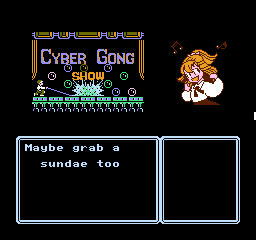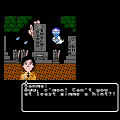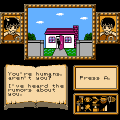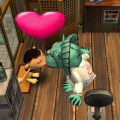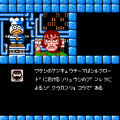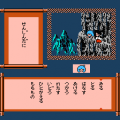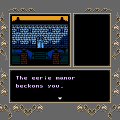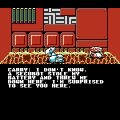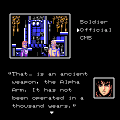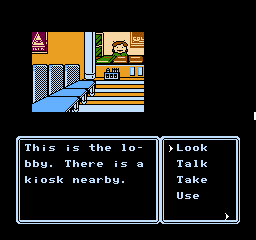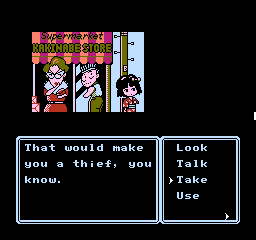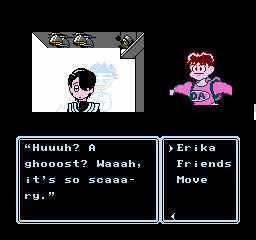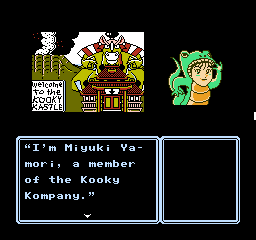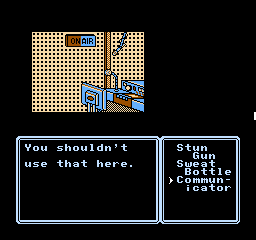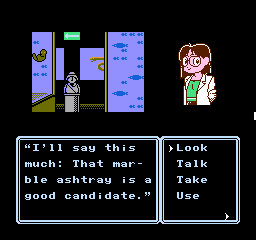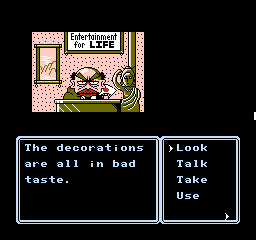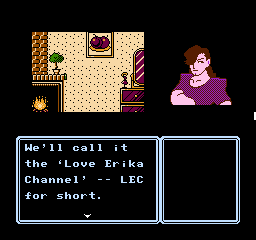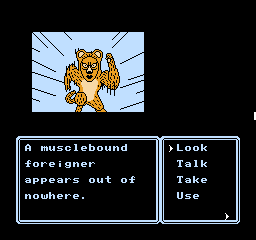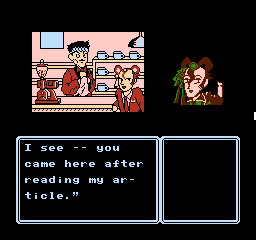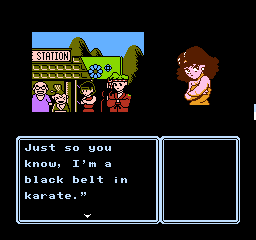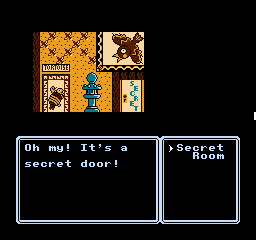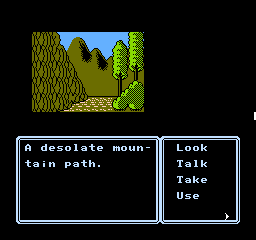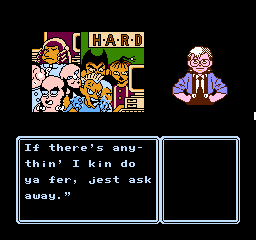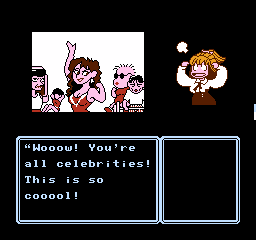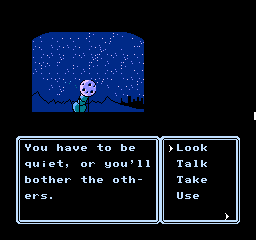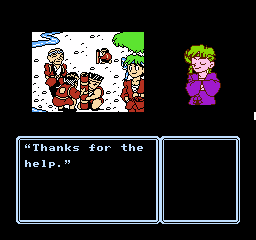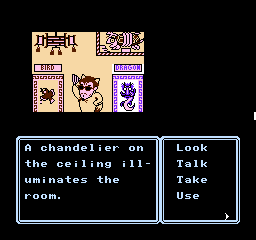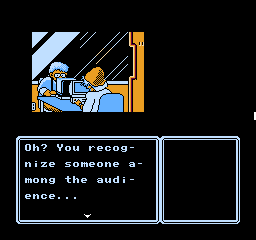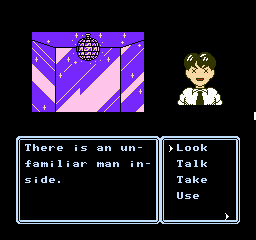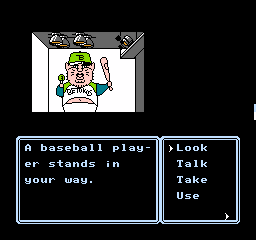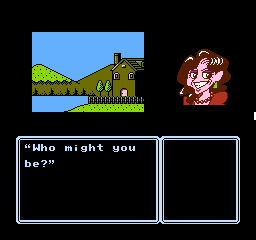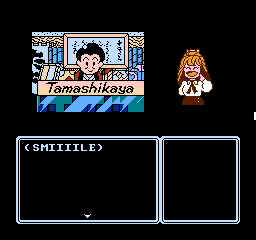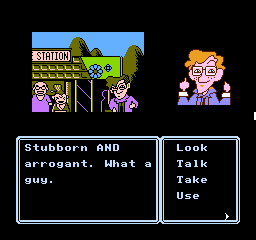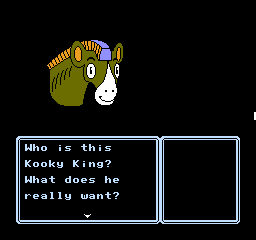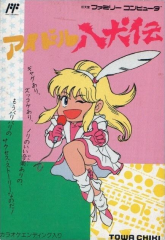
Famicom Cover
When it comes to NES games, Natsume are known for producing various action titles such as Shadow of the Ninja and Shatterhand. But they made their debut on the system and gaming in general with a pair of adventure titles that only came out in Japan. These were the bizarre Touhou Kenbun Roku (based on the travels of Marco Polo), and Idol Hakkenden – a simple and charming romp that’s well worth a look for fans of more streamlined adventure games.
The head of a prominent financial conglomerate is lying on her deathbed, and she promises to bestow her legacy onto the most successful of her three daughters. One daughter is a brilliant businesswoman who manages many companies, another is a renowned scholar and doctor, and then there’s Erika. Erika is a regular girl who’s good at singing, so she’s dismissed almost immediately by her sisters. But she wants to prove them wrong, and decides to become a pop star. To do this, she’ll need to recruit seven friends so that the eight of them can bring move the world with Erika’s songs. (The Hakkenden in the title is a reference to the eight warriors in the epic novel “Nansō Satomi Hakkenden”.)
Idol Hakkenden is an adventure game where you make progress by talking to people, and solving situational puzzles that could require using an item, showing off one of Erika’s talents such as singing, dancing, smiling and playing dumb, or consulting your friends’ advice. You’ll only have two or three friends with you at a time, but they each have unique talents that can be very useful if the occasion calls for it.
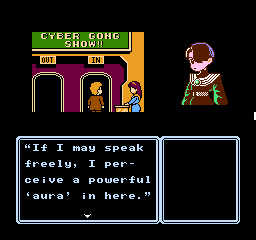
Hoshimi is your first friend, and is a fortune teller who can tell you where to go with her special powers. Momomi’s a fangirl whose knowledge of celebrities and popstars comes in very handy as the adventure goes on, while Misao is a technical genius that can handle computer-related issues. Yayoi and Yachiyo don’t appear in your party often, since they act behind the scenes as your financial expert and advisor respectively. You don’t see them much, but Murasaki the fireworks expert and martial artist Midori can help you out when you’re in a jam.
You’re presented with a list of actions you can perform, such as moving between locations or looking at objects and people, though there aren’t many actions compared to other Famicom adventure titles. Erika only has a handful of talents and a couple of friends with her at a time, and items aren’t carried between the game’s five chapters. In addition, each chapter is self-contained with unique locations, so you won’t be backtracking far to find the way forward.
The small number of options and locales available makes for a simple adventure where the answer to whatever situation you’re in is always nearby. Sometimes the game won’t even let you leave the room you’re currently in, making the act of finding the solution all the quicker. Although the lack of complexity will leave some wanting, it also allows players to venture into the game without having to take notes like they would for other adventure titles.
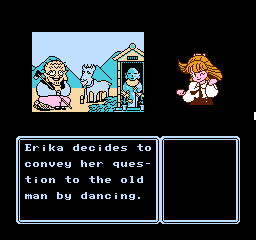
That’s not to say Idol Hakkenden‘s a complete cakewalk, as you’ll occasionally have to deal with some wordplay in accomplishing a task (such as going into the “TAKE” menu and picking “NOTES”, in order to “take notes” of what a character’s saying) or perform a specific sequence of actions. In the final two chapters, there’s even a couple of points where you can land yourself into a game over by making the wrong choice. But then said points immediately return you to the moment just before, so the priority is more on letting the player exist in the world and experience a goofy fun story.
Each of the game’s five chapters will see you encountering all kinds of strange people, such as the recurring reporter Kuwashi who insists on telling you unrelated facts, and getting into wild situations that range from a brawl between a gang and a construction crew to disarming a suicide bomber onstage. Characters don’t get a whole lot of dialogue, but their personalities are very well established, making it easy to get on board with what’s going on and eager to see what’s around the corner. There’s many cute details such as the game making fun of your decisions if they’re not useful and people chatting on the password screen in between chapters.
This is further enhanced by the adorable presentation. Although the screen is mostly taken up by black borders and the command menu in usual Famicom adventure fashion, the backgrounds are colorful and characters are presented through charmingly drawn sprites that capture their personalities, with Erika’s many sprites for her moods and actions being a particular highlight. The music by Kiyohiro Sada and Tomoo Misato provides a lively soundtrack that compliments the cheery and upbeat mood of the adventure, featuring a handful of tunes that Erika sings at crucial moments accompanied by onscreen lyrics.
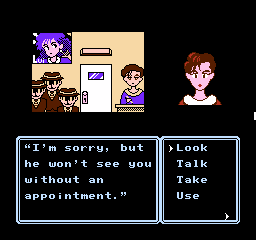
Idol Hakkenden became something of a cult classic, enough that it’s lived on in the hearts of fans for years afterwards. An online poll was held in 2015 by Natsume for fans to choose their favourite from ten of their titles, and Hakkenden won far more votes than any other game. GAME IMPACT, a group that organizes and runs retro-themed game events in Japan, hosted at least two events based on the game which included a great deal of merchandise, production material, interviews with the original developers and even arrangement albums of the soundtrack.
A light novel sequel was released in 2014, called アイドル八犬伝 南の島の太陽と星 or “Idol Hakkenden ~Sun and Stars on the Southern Island~”. Penned by visual novel writer Jō Shūdō, the sequel sees Erika and her friends winning a trip to the magical Atsukurushi Island after taking part in the Quiz de Hoe Hoe game show. An English fan translation was released by LIPEMCO! Translations in 2018, allowing for the game to be more easily played.
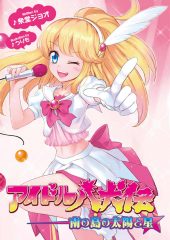
“Idol Hakkenden ~Sun and Stars on the Southern Island~”
LINKS:
An overview on Idol Hakkenden (albeit with spoilers) that also looks at the miscellaneous works, promotions and more discussed above: https://www.gaminghell.co.uk/IdolHakkenden.html
The English fan translation patch: https://www.romhacking.net/translations/3822/
